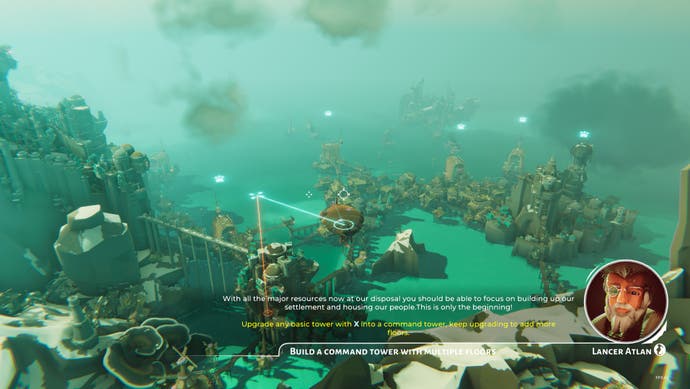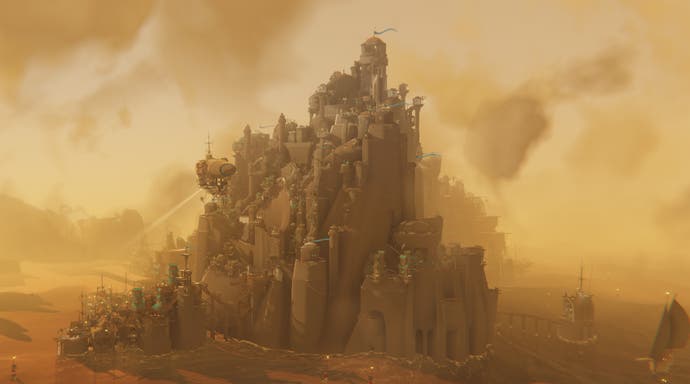"The fear phase": Tomas Sala on landing another Falconeer game
As Bulwark nears release, the developer looks back.
Earlier this year I spoke to Tomas Sala, the developer of The Falconeer and his new game, Bulwark: Falconeer Chronicles. I was particularly eager to chat while development on Bulwark was wrapping up, since, as a pretty-much solo developer, Sala's process has always seemed so explorative.
In the case of Bulwark, this explorative process has resulted in a truly fascinating game: an adventure that tasks you with building a civilisation in the middle of the ocean. Partly shaped by The Falconeer's universe - and partly shaped by an "evolving demo" - it's another Sala-made game that's impossible to pin down. So how does it feel to emerge from such an intuitive development?
How are things?
Tomas Sala: We're supposed to do the PlayStation submission in an hour and a half. They just messed up some spaces in the Japanese language. I've been doing this for three weeks! Every night I am doing the game dev thing. This is the non-fun part of development: "Oh, the lines in Japanese are overflowing on this screen." It's a hassle!
This ties in perfectly to the first question I was going to ask you. Last time we spoke, you said, "creativity is messy for me." And I'm fascinated: is there a time when you reach the end of the game, where you enter a period which feels a bit like tidying up? Is that where you are now?
Sala: I tweeted about this yesterday. I was in the bath, and I have all my ranty moments in the bath. I sit in the bath for like three hours trying to relax, and then rants come out.
For me, there's two phases to creativity. There's the free phase where you're just exploring and you're self-motivating. It's "Look at this!" And everything is exciting and new and you're figuring out new stuff. And that's its own thing.
And then you get to the point where everything's run by - I said fear, but it might just be vulnerability or anxiety. You get to the point where you have to bring this thing to the world and people are going to have an opinion about it. So then you get to the phase where you can no longer be free mentally, because you're concerned about what people are going to think and how it's going to work and if it's sufficient.
That's the two distinct parts of creativity. But I think most of my development mistakes in life are when I haven't realised that I've entered the second phase, where I think I'm still free, and I'm actually not. I'm already mentally bunkering up all my choices, rather than freely exploring. I call it fear, because it's very scary, because you're going out into the world. But it's actually very vulnerable. It's when you go: okay, I've made this, and now it's out there.
.png?width=690&quality=75&format=jpg&auto=webp)
.png?width=690&quality=75&format=jpg&auto=webp)
So I instantly have a question about that. How do you protect bold ideas? How do you protect your boldness from that second stage, where you reappraise things and you're more cautious?
Sala: You can't touch that creative place when you're in that phase. I think it might be a one-way street. So once you roll into that mindset where you're thinking about the other people in the world and what they think about what you're doing, or where you want to make a living, or you've got to meet a deadline, or the world sort of interferes? I don't think you can go back to that state where you make bold decisions. And that's where professionalism and discipline starts coming in.
Because then it becomes an intellectual pursuit, one where you have to analyze what you're doing. You're making intellectual choices based on the outcome you want. So you go tidying up, and I've found the more I do it, the more consciously I'm aware of it. I can see all the little wires that I've tied from trees and then I can start putting them together and weaving something out of it.
Sometimes that means killing something. I think that's the "kill your darlings" phase a little bit, where you're just weeding anything out and cleaning it up. It's much more intellectual, and you become harder and more grounded in your choices. And business-like. I think that's just the phases. I know people that can intermingle that stuff. But I cannot.
To flip it around, does anything creative ever come out of that analytical stage?
Sala: It does. I think for The Falconeer, I was stuck too much in the first phase, and not enough in the second phase. So it's very uncompromising, that game. It's sort of gritty and raw. But that's where I learned that you can actually analyze what you're doing, and sort of steer it.


So if you look at some art, sometimes it's so brutal if it's just coming from the artist's mind directly. It's hard to digest as a viewer. And when you're in that intellectual phase, you can reposition yourself as that viewer, and say: "Okay, I've done this. This is what it's supposed to do, this is what will affect the player or the viewer." And then you can steer it or sort of - I won't say "sanitise it" a little bit?
If you look at a Francis Bacon painting, and some of these grotesque, fleshy shapes? Sometimes it's too much. If you only want to show fear and anger that works, or personal trauma. But games are always aspirational; at some point you've got to want to get better at something. So I think that when you intellectually engage with it, you can cut out the bullshit a little bit and find the moment where it's like: "Okay, I like this. This is what I want." You can analyse yourself. "Okay, this is apparently what this is supposed to be. And now let's shape it a little bit where it's digestible for everybody." And I think "everybody" is a very loose term with what I do, because it's always going to be a small niche. But you're shaping it for more people than just me.
It's funny you're talking about Bacon, because you always remind me of one of those alla prima painters, the painters who just move paint around, and then it eventually gets into a great shape. And it's very id-like. But it sounds to me like now you're at the point where you can see what you've made through this process? What was so exciting about talking to you about this game over the last few years? It's just you're feeling towards it all the time. You know, you're like: "Oh, yeah, I've made this." But now you strike me as someone who's now actually got the whole shape of what you've done and you're reacting to that. You can see the whole thing.
Sala: Yeah, but the scary thing about it is you can see its failures as well. That's why it's the fear phase. You can see it. I always want to do more. There's never a moment where I go: stop. So you always want to do more. And at some point, you have to say, "Okay, let's wrap it up." And it's also the phase where I'm done with it for a little bit. The game needs to be in the world so I can recharge and then re-engage with what people thought about it.
It doesn't always work though, because when the fear creeps, it's also the fear of: I'm running out of money. And 2023 was brutal for indie games. I don't think that gets talked about enough. But you see a lot of these high quality indies that got a little funding from the free money period. And they were exploring boundaries. But people had freedom and then the money doesn't come in and now it's all going to be taken away. Because the market's been really rough on indies. There's not an indie I talk to that's not afraid.
So when that fear creeps in, it's very dangerous, because creatively you then want to say, ‘how can I make this more…?’ It's like some of the evolving demo stuff I did on Bulwark where I've worked with the people playing it and digesting it, and I was trying not to make too many mistakes in that sense.
But that's also why I cut the demo off at some point. It drives you to be more doubtful: you're getting more worried about what people will think. You can throw out the baby with the bathwater. And I think that's the greatest risk with what Bulwark is now: it's trying to do too many things. I can see that. It's doing quite a lot of things. And then there's, ‘oh let's make it more difficult, more challenging…’ So at the end of a project I'm fighting myself: how much do I want to do? It's been a fine balance, keeping that creative vibe, and then also: I want to make a good game, not just some personal statements. So that's why "fear" might be a good word for all this. It's very vulnerable. It means you're putting it out there. And it's very hard within that emotional buckshot you're getting, to remain firm in your convictions.
It's also incredibly dangerous, because it's very expensive for me by myself to try to keep the family alive, or keep things running. Because I don't do many gigs on the side or teaching. I need this. I do believe that if you do that interaction with your audience, it will teach you things that will expand your feeling of what you are making. And I've been very conscious of the people in the Discord that are super fans that, you know, play this game every day to relax, for hours and hours. Just because they can build stuff. I want to keep that alive. It's a tightrope. And sometimes, like in developing The Falconeer, it's very hard to engage with other people because it's all emotional stuff. And sometimes you can enjoy it. I did work-for-hire for 15 years, listening to clients all the time. So maybe this was sort of a re-acknowledging that that's not all bad. You have to soften up at some point.
I think Bulwark's still this idiosyncratic, weird thing. What I like about where it's at now is that it has all these bits in place and everything's voiced and there's lots of content. And you can go to the other settlements. Some resources run out, and then you need to move and trade and so on. But it's still about you saying: ‘Okay, I have this little fortress world. Now I'm going to declare war and see what happens.’ Someone's going to say, ‘Well, it doesn't have the depth of like, any Paradox game’, but there's just a little bit of a hint there: it's always there for you to interact with. You know, Windows Central said: ‘It's a low-stakes strategy conquer-the-word game.’ And I think: yeah, that's sort of where I want it.
.png?width=690&quality=75&format=jpg&auto=webp)

